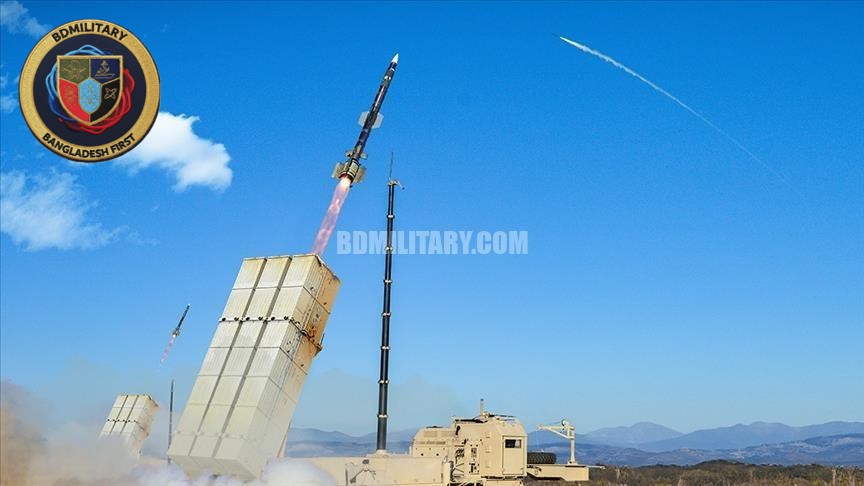Over the past decade the Armed Forces of Bangladesh (AFB) have made clear their intent to broaden their procurement base, moving away from over-reliance on any single supplier and reinforcing operational independence and diplomatic flexibility. For Dhaka, the choice to source major military hardware and technology from NATO-origin countries—including Türkiye, Italy, France, Germany and the United Kingdom (UK), in addition to the United States—is a calculated one, and the United States is unlikely to object.
Indeed, Washington should view this as an opportunity: by supporting key acquisitions—such as Italian-origin Eurofighter Typhoon multirole combat aircraft, Turkish and UK-sourced warships and shipbuilding transfer, and Turkish air-defence and UAV technologies—it stands to align Dhaka’s interests with those of the West, while mitigating China’s influence in Bangladesh’s defence ecosystem.
Overview of Bangladeshi Arms Imports from NATO-Origin Suppliers (2015–2025)
Precise country-by-country breakdowns of all procurements are not publicly disclosed, but multiple sources show a consistent trend: Bangladesh is deepening procurement from NATO-origin suppliers in air, naval, and land systems.
2015–2017: Early Diversification
Dhaka began signalling its intent to move beyond dependence on Chinese-origin arms. During this period, it explored technology partnerships and training linkages with Italy and the UK, and upgraded naval radar and communication systems sourced from France and Germany.
2018–2021: Turkish and European Entry
This period saw a major uptick in Turkish defence cooperation. Bangladesh procured the Bayraktar TB2 UCAV, expanding its reconnaissance and strike capability. Italian and French radar systems were introduced to modernise the Air Force’s early-warning network. Germany supplied air-traffic management and training simulators, while the UK supported naval and maritime domain awareness training.
2022–2025: Consolidation and Technology Transfer
From 2022 onwards, Türkiye emerged as Bangladesh’s second-largest non-Asian supplier. The Hisar-O+ and Siper air-defence systems are reported to be under active evaluation, while Baykar platforms continue to be integrated into Army and Air Force UAV doctrine. Italy’s Leonardo has been positioned to offer the Eurofighter Typhoon, while shipbuilding cooperation discussions have advanced with both Türkiye’s ASFAT and UK naval design bureaus.
Under the Forces Goal 2030 modernisation framework, these partnerships mark a decisive step toward NATO-origin interoperability and autonomy from single-source dependency.
Why Diversification Matters for Bangladesh
Operational Independence and Sovereignty
Maintaining a diversified sourcing network ensures that no foreign supplier can unilaterally constrain Bangladesh’s military readiness or sovereignty. This policy aligns with the strategic doctrine of “sovereign defence capability” outlined under Forces Goal 2030.
Diplomatic Leverage and Balancing
A multi-source procurement strategy enhances Dhaka’s negotiating leverage. It allows Bangladesh to maintain cordial relations with both Western and Eastern blocs while securing favourable terms, local participation, and flexible export conditions.
Industrial and Technological Development
NATO-origin systems frequently include offset clauses and technology-transfer opportunities. Bangladesh’s goal of establishing a domestic maintenance and assembly capability—particularly for UAVs and light naval craft—benefits directly from such agreements.
Mitigating Strategic Risk
Diversification guards against potential embargoes, sanctions, or supply disruptions. This is particularly vital for a country that must maintain readiness along multiple border environments and littoral zones.
Strategic Signalling
By importing from NATO-origin states, Bangladesh signals its commitment to professionalisation, transparency, and balance in defence affairs—an implicit reassurance to regional powers and global partners that Dhaka is neither aligned with nor beholden to any single major power.
Why the United States Should Support Bangladesh’s NATO-Origin Procurement
Eurofighter Typhoon (Italy)
Dhaka’s potential procurement of the Eurofighter Typhoon represents a significant step toward Western-aligned air-power capability. US endorsement—direct or indirect—of the deal would encourage greater Western industrial participation in Bangladesh and reduce dependence on Chinese systems.
Naval Shipbuilding (Türkiye, UK)
Both Türkiye’s ASFAT and British shipyards offer modular warship designs, suitable for Bangladesh’s littoral and offshore security requirements. Encouraging such projects aligns with US regional maritime objectives and enhances the interoperability of Western systems in the Bay of Bengal.
Air-Defence and UAV Systems (Türkiye)
The Turkish Hisar-O+ and Siper medium-range systems offer Bangladesh an export-friendly, ITAR-independent platform. These acquisitions enhance Dhaka’s integrated air-defence network without introducing politically restrictive conditions, while deepening interoperability with Western allies.
Strategic Context: ACSA and GSOMIA
The US has long sought to secure Acquisition Cross-Servicing (ACSA) and General Security of Military Information (GSOMIA) agreements with Bangladesh. However, as analysts note, the US ambassadorial nominee Brent Christensen will struggle to convince Dhaka to sign unless Washington offers tangible incentives—such as access to advanced NATO-origin defence technology.
For now, Beijing appears unconcerned, knowing the US has not placed major offers on the table. If Washington facilitates Bangladesh’s diversification instead of resisting it, Dhaka may view the US as a credible defence partner capable of offering alternatives to Chinese leverage.
Assessment
Bangladesh’s arms-acquisition pattern between 2015 and 2025 demonstrates a clear trajectory: a transition from dependence on singular sources to a diversified, NATO-origin ecosystem encompassing air, naval, and land domains.
This shift is not merely transactional—it is strategic. It strengthens operational autonomy, mitigates risks, fosters industrial development, and enhances Dhaka’s diplomatic flexibility.
For the United States and its allies, this presents an opening to strengthen engagement with Bangladesh. Supporting Eurofighter acquisitions, Turkish-UK shipbuilding cooperation, and NATO-standard air-defence projects would not only help address Bangladesh’s legitimate security concerns but also reinforce Western influence in the Indo-Pacific.
Rather than viewing Dhaka’s diversification as a deviation, Washington should view it as alignment—an evolution toward a sovereign yet Western-compatible defence posture in South Asia’s emerging security architecture.
Annex: Selective Array of NATO-Origin Defence Acquisitions (2015–2025)
| Year | Category | Supplier (NATO Country) | System / Programme | Status / Note |
|---|---|---|---|---|
| 2015 | Naval Systems | France / Germany | Navigation, radar, and comms upgrades for BNS vessels | Delivered |
| 2016 | Training & Simulation | Germany | Air traffic and flight training simulators | Delivered |
| 2017 | Naval Support | UK | Hydrographic and maritime surveillance cooperation | Ongoing |
| 2018 | UAV Systems | Türkiye | Bayraktar TB2 UCAV | Operational |
| 2019 | Radar Systems | Italy / France | Early-warning and control radars | In service |
| 2020 | Small Arms / Optics | UK | Training weapons and optics | Delivered |
| 2021 | Air Systems | Italy | Eurofighter Typhoon evaluation initiated under Forces Goal 2030 | Under negotiation |
| 2022 | Air Defence | Türkiye | Hisar-O+ system offer | Evaluated |
| 2023 | Naval Shipbuilding | Türkiye / UK | Corvette and patrol vessel design transfer discussions | Ongoing |
| 2024 | UAV Expansion | Türkiye | TB2 follow-on batch and maintenance support | Contracted |
| 2025 | Air Defence & Fighter Acquisition | Italy / Türkiye | Eurofighter Typhoon procurement talks; Siper long-range system evaluation | In progress |
Sources: BDMilitary analysis, open-source defence trade data, Jane’s Defence Weekly archives, and national procurement disclosures.

Khaled Ahmed is a seasoned former intelligence analyst and military expert from the Netherlands, bringing over 15 years of specialised experience in operational intelligence, threat analysis, and strategic defence planning. Having served in high-level, classified roles within Dutch military intelligence, he possesses rare expertise in European security architecture, NATO doctrine, and asymmetric warfare. Khaled’s deep operational insight and international perspective enable him to deliver precision-driven intelligence analysis and forward-looking strategic forecasts. A trusted contributor to high-level risk assessments and security briefings, he offers readers clarity on complex defence and security challenges. Khaled leads the National Security and Fact Analysis sections at BDMilitary. He holds a Master’s degree in International Relations from the University of Groningen, The Netherlands, and is fluent in Dutch, French, and Arabic — combining linguistic dexterity with operational expertise to analyse security issues across cultures and regions.


